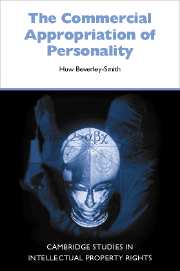Book contents
- Frontmatter
- Contents
- Preface
- Table of cases
- Table of statutes
- Part I A framework
- Part II Economic interests and the law of unfair competition
- 2 Introduction
- 3 Statutory and extra-legal remedies
- 4 Goodwill in personality: the tort of passing off in English and Australian law
- 5 Unfair competition and the doctrine of misappropriation
- Part III Dignitary interests
- Part IV Pervasive problems
- Part V Conclusions
- Bibliography
- Index
- Cambridge Studies in Intellectual Property
2 - Introduction
Published online by Cambridge University Press: 07 July 2009
- Frontmatter
- Contents
- Preface
- Table of cases
- Table of statutes
- Part I A framework
- Part II Economic interests and the law of unfair competition
- 2 Introduction
- 3 Statutory and extra-legal remedies
- 4 Goodwill in personality: the tort of passing off in English and Australian law
- 5 Unfair competition and the doctrine of misappropriation
- Part III Dignitary interests
- Part IV Pervasive problems
- Part V Conclusions
- Bibliography
- Index
- Cambridge Studies in Intellectual Property
Summary
Part II considers the extent to which economic interest in personality may be protected from the first main perspective: unfair competition. The major common law and civil law jurisdictions adopt rather different approaches to unfair competition in general, and appropriation of personality in particular. These approaches, and the relative importance of statutory and common law causes of action in protecting economic interests in intangibles, need to be grasped at the outset.
Article 10 bis of the Paris Convention for the Protection of Industrial Property obliges signatories to provide effective protection against unfair competition which is contrary to honest practices in industrial or commercial matters. Three particular aspects are expressly included: (i) creating confusion with or discrediting the establishment, the goods or the commercial activities of a competitor; (ii) making false allegations which discredit the establishment, goods, or the industrial or commercial activities of a competitor; and (iii) giving indications liable to mislead the public as to the nature, manufacturing process, characteristics, suitability for purpose or quantity of goods. Beyond these acts, case law and legislation in various jurisdictions have provided protection, to varying degrees and in various forms, against such activities as the violation of trade secrets, comparative advertising and misappropriation or free riding (such as the dilution of the value of a trade mark in the absence of confusion).
- Type
- Chapter
- Information
- The Commercial Appropriation of Personality , pp. 27 - 31Publisher: Cambridge University PressPrint publication year: 2002



